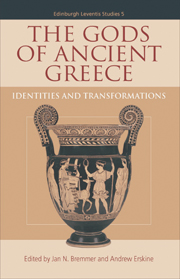Book contents
- Frontmatter
- Contents
- Preface
- List of Illustrations
- Notes on Contributors
- List of Abbreviations
- Introduction: The Greek Gods in the Twentieth Century
- 1 What is a Greek God?
- PART I SYSTEMATIC ASPECTS
- PART II INDIVIDUAL DIVINITIES AND HEROES
- PART III DIACHRONIC ASPECTS
- 14 Early Greek Theology: God as Nature and Natural Gods
- 15 Gods in Early Greek Historiography
- 16 Gods in Apulia
- 17 Lucian's Gods: Lucian's Understanding of the Divine
- 18 The Gods in the Greek Novel
- 19 Reading Pausanias: Cults of the Gods and Representation of the Divine
- 20 Kronos and the Titans as Powerful Ancestors: A Case Study of the Greek Gods in Later Magical Spells
- 21 Homo fictor deorum est: Envisioning the Divine in Late Antique Divinatory Spells
- 22 The Gods in Later Orphism
- 23 Christian Apologists and Greek Gods
- 24 The Materiality of God's Image: Olympian Zeus and Ancient Christology
- PART IV HISTORIOGRAPHY
- Epilogue
- Index
19 - Reading Pausanias: Cults of the Gods and Representation of the Divine
from PART III - DIACHRONIC ASPECTS
Published online by Cambridge University Press: 05 August 2013
- Frontmatter
- Contents
- Preface
- List of Illustrations
- Notes on Contributors
- List of Abbreviations
- Introduction: The Greek Gods in the Twentieth Century
- 1 What is a Greek God?
- PART I SYSTEMATIC ASPECTS
- PART II INDIVIDUAL DIVINITIES AND HEROES
- PART III DIACHRONIC ASPECTS
- 14 Early Greek Theology: God as Nature and Natural Gods
- 15 Gods in Early Greek Historiography
- 16 Gods in Apulia
- 17 Lucian's Gods: Lucian's Understanding of the Divine
- 18 The Gods in the Greek Novel
- 19 Reading Pausanias: Cults of the Gods and Representation of the Divine
- 20 Kronos and the Titans as Powerful Ancestors: A Case Study of the Greek Gods in Later Magical Spells
- 21 Homo fictor deorum est: Envisioning the Divine in Late Antique Divinatory Spells
- 22 The Gods in Later Orphism
- 23 Christian Apologists and Greek Gods
- 24 The Materiality of God's Image: Olympian Zeus and Ancient Christology
- PART IV HISTORIOGRAPHY
- Epilogue
- Index
Summary
Over the past couple of decades Pausanias has become the centre of a minor academic industry, a point made recently by Glen Bowersock. The growing scholarship in this area has taken Pausanias' profile seriously and his work at face value. One of the major trends has been the appreciation of Pausanias' work as a complex literary enterprise and not just as a databank to be plundered without taking into consideration the context of each piece of information, be it chronological or narratological. Such a flourishing interest in Pausanias' work has also been inspired by the increasing interest in the Greek world under Roman rule, the world to which Pausanias belonged, and the related question of what it meant to be Greek when power was held elsewhere.
Pausanias was a serious scholar and a tireless traveller. Maybe he can also be considered as ‘dry, sober and pedantic’, as a German scholar described him in 1890. Perhaps he is almost ‘one of us’, as Snodgrass concluded in a wonderful paper on Pausanias and the Chest of Kypselos in 2001. However true these identifications may be – and perhaps all are true – Pausanias had many problems to solve and many choices to make in order to transpose his vision and understanding of the material and cultural landscapes of Greece into a literary work. The Periegesis is the result of these choices and not a photographic image of what Greece was like at this time. This is true for every piece and type of information. It is even truer as far as religion is concerned, especially since Pausanias still belongs to the system he describes. On this level, he is not one of us. Therefore, reading Pausanias in order to consider the question of Greek gods implies that we should take into account his own position on the matter, on the one hand, and the way he reports the many results of his visits on the spot, combining them with literary references, on the other hand.
- Type
- Chapter
- Information
- The Gods of Ancient GreeceIdentities and Transformations, pp. 375 - 387Publisher: Edinburgh University PressPrint publication year: 2010



